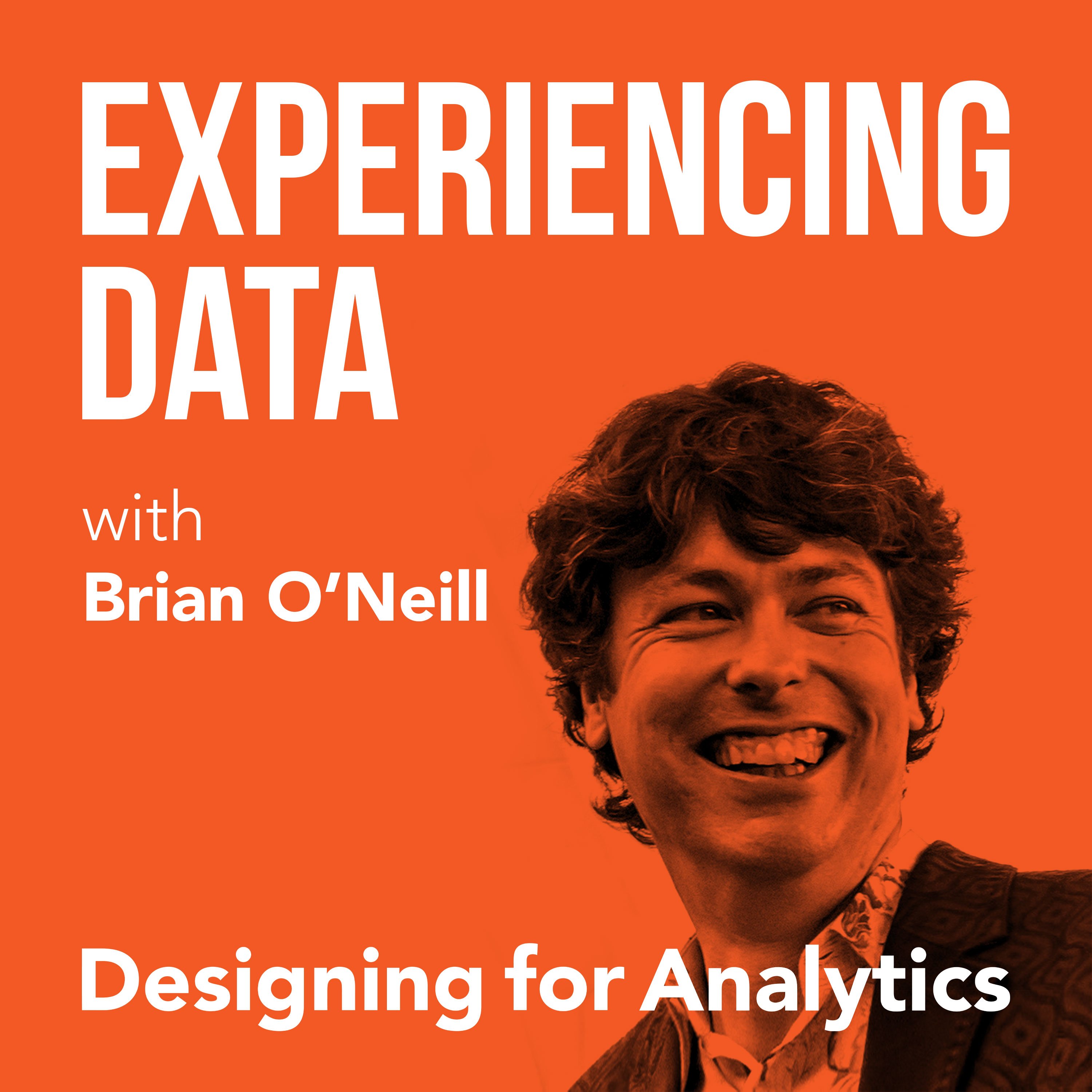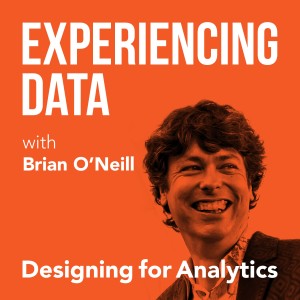

141.5K
Downloads
173
Episodes
Is the value of your enterprise analytics SAAS or AI product not obvious through it’s UI/UX? Got the data and ML models right...but user adoption of your dashboards and UI isn’t what you hoped it would be? While it is easier than ever to create AI and analytics solutions from a technology perspective, do you find as a founder or product leader that getting users to use and buyers to buy seems harder than it should be? If you lead an internal enterprise data team, have you heard that a ”data product” approach can help—but you’re concerned it’s all hype? My name is Brian T. O’Neill, and on Experiencing Data—one of the top 2% of podcasts in the world—I share the stories of leaders who are leveraging product and UX design to make SAAS analytics, AI applications, and internal data products indispensable to their customers. After all, you can’t create business value with data if the humans in the loop can’t or won’t use your solutions. Every 2 weeks, I release interviews with experts and impressive people I’ve met who are doing interesting work at the intersection of enterprise software product management, UX design, AI and analytics—work that you need to hear about and from whom I hope you can borrow strategies. I also occasionally record solo episodes on applying UI/UX design strategies to data products—so you and your team can unlock financial value by making your users’ and customers’ lives better. Hashtag: #ExperiencingData. JOIN MY INSIGHTS LIST FOR 1-PAGE EPISODE SUMMARIES, TRANSCRIPTS, AND FREE UX STRATEGY TIPS https://designingforanalytics.com/ed ABOUT THE HOST, BRIAN T. O’NEILL: https://designingforanalytics.com/bio/
Episodes

Tuesday Apr 20, 2021
Tuesday Apr 20, 2021
Debbie Reynolds is known as “The Data Diva” — and for good reason.
In addition to being founder, CEO and chief data privacy officer of her own successful consulting firm, Debbie has been named to the Global Top 20 CyberRisk Communicators by The European Risk Policy Institute in 2020. She’s also written a few books, such as The GDPR Challenge: Privacy, Technology, and Compliance In An Age of Accelerating Change; as well as articles for other publications.
If you are building data products, especially customer-facing software, you’ll want to tune into this episode. Debbie and Ihad an awesome discussion about data privacy from the lens of user experience instead of the typical angle we are all used to: legal compliance. While collecting user data can enable better user experiences, we can also break a customer’s trust if we don’t request access properly.
In our chat, we covered:
- 'Humans are using your product': What it means to be a 'data steward' when building software. (0:27)
- 'Privacy by design': The importance for software creators to think about privacy throughout the entire product creation process. (4:32)
- The different laws (and lack thereof) regarding data privacy — and the importance to think about a product's potential harm during the design process. (6:58)
- The importance of having 'diversity at all levels' when building data products. (16:41)
- The role of transparency in data collection. (19:41)
- Fostering a positive and collaborative relationship between a product or service’s designers, product owners, and legal compliance experts. (24:55)
- The future of data monetization and how it relates to privacy. (29:18)
Resources and Links:
Quotes from Today’s Episode
When it comes to your product, humans are using it. Regardless of whether the users are internal or external — what I tell people is to put themselves in the shoes of someone who’s using this and think about what you would want to have done with your information or with your rights. Putting it in that context, I think, helps people think and get out of their head about it. Obviously there’s a lot of skill and a lot of experience that it takes to build these products and think about them in technical ways. But I also try to tell people that when you’re dealing with data and you’re building products, you’re a data steward. The data belongs to someone else, and you’re holding it for them, or you’re allowing them to either have access to it or leverage it in some way. So, think about yourself and what you would think you would want done with your information. - Debbie (3:28)
Privacy by design is looking at the fundamental levels of how people are creating things, and having them think about privacy as they’re doing that creation. When that happens, then privacy is not a difficult thing at the end. Privacy really isn’t something you could tack on at the end of something; it’s something that becomes harder if it’s not baked in. So, being able to think about those things throughout the process makes it easier. We’re seeing situations now where consumers are starting to vote with their feet — if they feel like a tool or a process isn’t respecting their privacy rights, they want to be able to choose other things. So, I think that’s just the way of the world. .... It may be a situation where you’re going to lose customers or market share if you’re not thinking about the rights of individuals. - Debbie (5:20)
I think diversity at all levels is important when it comes to data privacy, such as diversity in skill sets, points of view, and regional differences. … I think people in the EU — because privacy is a fundamental human right — feel about it differently than we do here in the US where our privacy rights don’t really kick in unless it’s a transaction. ... The parallel I say is that people in Europe feel about privacy like we feel about freedom of speech here — it’s just very deeply ingrained in the way that they do things. And a lot of the time, when we’re building products, we don’t want to be collecting data or doing something in ways that would harm the way people feel about your product. So, you definitely have to be respectful of those different kinds of regimes and the way they handle data. … I’ll give you a biased example that someone had showed me, which was really interesting. There was a soap dispenser that was created where you put your hand underneath and then the soap comes out. It’s supposed to be a motion detection thing. And this particular one would not work on people of color. I guess whatever sensor they created, it didn’t have that color in the spectrum of what they thought would be used for detection or whatever. And so those are problems that happen a lot if you don’t have diverse people looking at these products. Because you — as a person that is creating products — you really want the most people possible to be able to use your products. I think there is an imperative on the economic side to make sure these products can work for everyone. - Debbie (17:31)
Transparency is the wave of the future, I think, because so many privacy laws have it. Almost any privacy law you think of has transparency in it, some way, shape, or form. So, if you’re not trying to be transparent with the people that you’re dealing with, or potential customers, you’re going to end up in trouble. - Debbie (24:35)
In my experience, while I worked with lawyers in the digital product design space — and it was heaviest when I worked at a financial institution — I watched how the legal and risk department basically crippled stuff constantly. And I say “cripple” because the feeling that I got was there’s a line between adhering to the law and then also—some of this is a gray area, like disclosure. Or, if we show this chart that has this information, is that construed as advice? I understand there’s a lot of legal regulation there. My feeling was, there’s got to be a better way for compliance departments and lawyers that genuinely want to do the right thing in their work to understand how to work with product design, digital design teams, especially ones using data in interesting ways. How do you work with compliance and legal when we’re designing digital products that use data so that it’s a team effort, and it’s not just like, “I’m going to cover every last edge because that’s what I’m here to do is to stop anything that could potentially get us sued.” There is a cost to that. There’s an innovation cost to that. It’s easier, though, to look at the lawyer and say, “Well, I guess they know the law better, so they’re always going to win that argument.” I think there’s a potential risk there. - Brain (25:01)
Trust is so important. A lot of times in our space, we think about it with machine learning, and AI, and trusting the model predictions and all this kind of stuff, but trust is a brand attribute as well and it’s part of the reason I think design is important because the designers tend to be the most empathetic and user-centered of the bunch. That’s what we’re often there to do is to keep that part in check because we can do almost anything these days with the tech and the data, and some of it’s like, “Should we do this?” And if we do do it, how do we do it so we’re on brand, and the trust is built, and all these other factors go into that user experience. - Brian (34:21)
No comments yet. Be the first to say something!